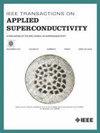Thermal Stability of BaK122 Superconducting Bulks in Sealed Conditions
IF 1.7
3区 物理与天体物理
Q3 ENGINEERING, ELECTRICAL & ELECTRONIC
引用次数: 0
Abstract
The thermal stability of BaK122 is a critical parameter for practical applications, such as in the fabrication of the superconducting joint, the re-sintering of the coil, etc. Therefore, study on the thermal stability of BaK122 at high temperatures is necessary. In this work, thermal stability of the BaK122 superconducting bulks was investigated under various sealed conditions. It is found that significant FeAs impurity is formed on the surface of BaK122 samples sintered at 800 °C, while unknown impurities emerge at 900 °C. Specifically, FeAs is distributed within ∼0.2 mm of the surface for the samples sintered at 900 °C, whereas unknown phases are within ∼0.1 mm. Increasing the sintering spatial density will suppress surface phase decomposition and obviously improve superconductivity of the samples. The decomposition of BaK122 is primarily induced by K loss. The introduction of elemental K in a sealed environment will effectively restrain surface decomposition and have a moderate impact on superconductivity of BaK122. The mechanisms of BaK122 decomposition in sealed conditions were summarized based on the experiment results.密封条件下BaK122超导体的热稳定性
BaK122的热稳定性是实际应用的关键参数,如超导接头的制造、线圈的再烧结等。因此,研究BaK122在高温下的热稳定性是很有必要的。本文研究了BaK122超导体在不同密封条件下的热稳定性。在800℃烧结的BaK122样品表面形成了明显的FeAs杂质,而在900℃烧结时则出现了未知的杂质。具体来说,在900°C烧结的样品中,FeAs分布在表面的~ 0.2 mm内,而未知相分布在~ 0.1 mm内。增大烧结空间密度可以抑制表面相分解,明显提高样品的超导性。BaK122的分解主要是由K损失引起的。在密封环境中引入K元素可以有效地抑制BaK122的表面分解,并对其超导性产生适度的影响。根据实验结果,总结了密闭条件下BaK122的分解机理。
本文章由计算机程序翻译,如有差异,请以英文原文为准。
求助全文
约1分钟内获得全文
求助全文
来源期刊

IEEE Transactions on Applied Superconductivity
工程技术-工程:电子与电气
CiteScore
3.50
自引率
33.30%
发文量
650
审稿时长
2.3 months
期刊介绍:
IEEE Transactions on Applied Superconductivity (TAS) contains articles on the applications of superconductivity and other relevant technology. Electronic applications include analog and digital circuits employing thin films and active devices such as Josephson junctions. Large scale applications include magnets for power applications such as motors and generators, for magnetic resonance, for accelerators, and cable applications such as power transmission.
 求助内容:
求助内容: 应助结果提醒方式:
应助结果提醒方式:


